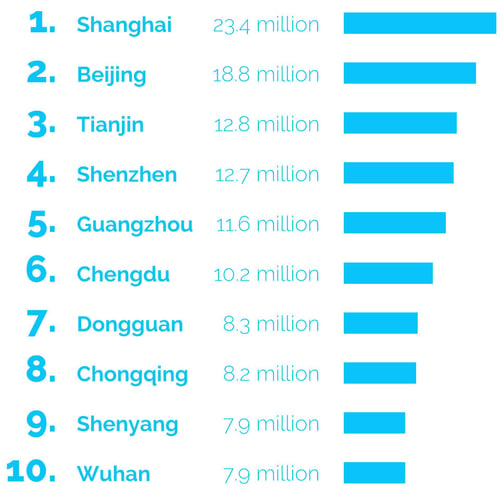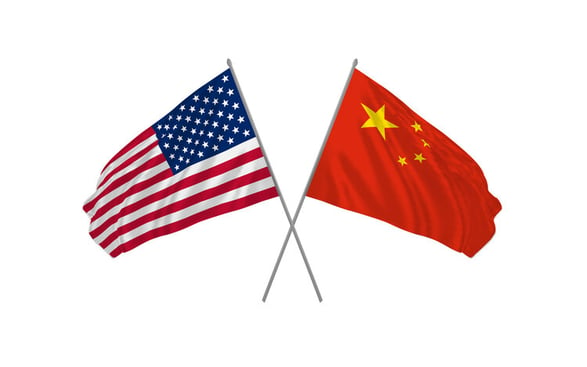CHINA IT FIELD SERVICES
The ultimate guide to doing business in China.
If you’re planning a retail technology or telecommunications deployment in China, your company is on its way to cracking the world’s fastest-growing market. Consider that China has six cities with populations larger than New York City. That figure is eye-opening enough.
However, here’s the number that really blows one’s mind when thinking about China’s vast market: China has over 100 cities now with a population of one million or more. By comparison, the United States has 10.
What do all these people mean? Opportunity. A vast reservoir of consumers with a voracious appetite for retail and telecom has emerged from this massive population. Consider this from The World Bank:
“Since initiating market reforms in 1978, China has shifted from a centrally-planned to a market-based economy and has experienced rapid economic and social development. GDP growth has averaged nearly 10 percent a year—the fastest sustained expansion by a major economy in history—and has lifted more than 800 million people out of poverty. “
That’s 800 million newly minted middle class with an appetite for IT and retail tech. Your decision to tap into China is a wise one, but there are some things you should know first.

BEWARE THE POLITICAL WINDS
If you’re looking to do business in Portugal or Oman, those are economies that are generally off the U.S. radar, pretty stable, and not buffeted by changing political climates.
Not so with China. The U.S. and China are, as of this writing, involved in a pretty fierce back and forth over trade and tariffs, and if you aren’t careful, your company could get sucked into the vortex.
The best advice we can give on this front is to monitor the situation as it changes seemingly daily, and partner with a global IT field services company that understands the changing situation on the ground and can help your company best navigate the shoals.
THE SILK ROAD AND ZONES
China has been slowly shedding a slow, cumbersome centrally planned economy and replacing it — gradually — with a vibrant market-based economy heavily managed by the government.
As an incentive to develop, the government has initiated numerous local enterprise zones and one massive one. The more romantic term for the massive zone is “The Silk Road,” but everyone uses the clunkier term “Belt and Road,” the “belt” is inland, the “road” refers to the sea.
However, both are meant to connect China with Europe in a belt of trade punctuated by smart ports and smart cities wired to the world. long the Belt and Road, there will be plenty of telecom opportunities.
There are plenty of other government-infused programs to spur technological innovation in China. Perhaps your company can take advantage of one of them.
WORDS AND ABBREVIATIONS YOU NEED TO KNOW
Guanxi: Doing business in China involves a version of what might be known as schmoozing in the west. In China, a personal connection is as essential as a business connection.
Consider this from the University of Nottingham’s international business school:
“Conducting business in China, especially for multinational companies coming from the West, might be challenging since they need to understand and deal with the Chinese business culture which they are not used to. Guanxi, which is a complex item of relationships between people, is often perceived as a quite distinct element of Chinese business culture.”
Be prepared to enter into sometimes intense, multi-faceted business relationships in China to open doors. Read more about guanxi here.
CCC: Any telecom product in China must earn the coveted CCC. CCC is China's own quality mark and required for a wide range of products. Read this guide to know if your products need the CCC mark.
NIDZ: National Innovation Demonstration Zone. These are special government “carve-outs” in cities across China that enjoy special status as innovation incubators of tech start-ups and retail experimentation. Look for these special zones when exploring your China deployment.

WHAT TELECOMS NEED TO KNOW
Opportunity abounds. Setting up a telecom-related business in China isn’t the same as selling Big Macs. There are real-world implications to become part of a telecom transformation that is lifting China, in a short time, from a third-world economic dead zone to a top of the world powerhouse. There’s a connection between telecom and global economic might.

CONSIDER THIS FROM CHINA
“Conducting business in China, especially for multinational companies coming from the West, might be challenging since they need to understand and deal with the Chinese business culture which they are not used to. Guanxi, which is a complex item of relationships between people, is often perceived as a quite distinct element of Chinese business culture.”
We’re talking about telecom and IT opportunities that go far beyond what was once imaginable. China’s appetite for tech and opportunities for telecom will expand to smart homes, smart cities, AI-powered technology, broadband wireless, cloud-based services, banking, VPNs, security camera networks, and on and on and on.
While China has a robust and regulated domestic telecom presence, there are still plenty of opportunities — at the moment — for abroad telecoms to partner and enter the market.
RETAIL TECH IN CHINA
While China’s telecom appetite is increasing and voracious, Chinese consumers have been lifted by recent economic reforms, and there is now a rapidly growing retail sector. Much of the action in Chinese retail — like the rest of the world — has shifted away from bricks and mortar to cyberspace.
Some of these key accounts will be online retailers. As summed by McKinsey:
“China’s online retail market, already the world’s largest at approximately $830 billion, is also the fastest growing. For the past three years, its compound annual growth rate has been 38.1 percent, almost thrice the US rate of 13.6 percent. In 2017, China’s e-commerce market is expected to surpass those of Europe and the United States. Online and multichannel retailers are therefore crucial players in China’s consumer-goods ecosystem, to a greater extent than in developed markets.”
BEYOND BEIJING
There is economic life in China beyond Beijing and Shanghai. There’s nothing wrong with those two cities, but when planning your deployment, take advantage of special Chinese economic zones, check out the “Road and Belt,” and use all the data you can to find the best fit.
Otherwise, just to give you a taste, here are China’s top 10 cities by population:

A TOUCH OF THE U.S. NEARBY
Having a U.S. consulate nearby can aid in a variety of ways when deploying overseas. Here are the locations of U.S. consular services in China:

U.S. Embassy of Beijing, China
Main Embassy Building: No. 55 An Jia Lou Lu, Beijing 100600Ritan Branch: No. 2 Xiushui Dongjie, Jianguomenwai, Beijing 100600
U.S. Consulate General in Chengdu, China
4 Lingshiguan Road, Chengdu, Sichuan 610041
U.S. Consulate General in Guangzhou, China
Huaxia Road, Zhujiang New Town, (near Exit B1 of the Zhujiang New Town subway station, Line 3 and Line 5), Tianhe District, Guangzhou
U.S. Consulate General in Shanghai, China
1038 West Nanjing Road, Westgate Mall 8th Floor, Shanghai 200041
U.S. Consulate General in Shenyang, China
52, 14th Wei Road, Heping District, Shenyang 110003
FIND A PARTNER
We can’t stress enough the importance of finding a skilled global field services partner that can help you navigate China’s complex labyrinth of tax laws and government regulations some, which to the outside observer, seem somewhat arbitrary like this recent one: You can’t name your company something that is too big a mouthful or “offbeat.”
Thinking of calling your new venture: Wonderfully Efficient Span the Globe Tech Titans at Your Service? That might not fly with Chinese officials, who dictated the rules saying that new companies cannot register names that are paragraphs or long sentences, or that include sensitive language, including political terms. They also give the government authority to fix “inappropriate” names as it sees fit.
You want a partner that is with you 24/7, whenever, and wherever, that can offer platform management and scalable services. During these challenging times, you want a steady hand to be holding yours as you navigate China.
